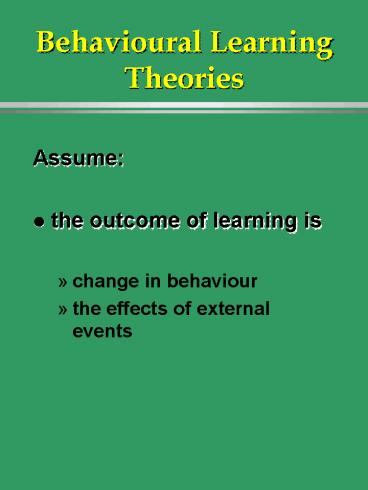Behavioural Learning Theories - PowerPoint PPT Presentation
1 / 14
Title: Behavioural Learning Theories
1
Behavioural Learning Theories
- Assume
- the outcome of learning is
- change in behaviour
- the effects of external events
2
Theories
- Classical Conditioning
- Operant Conditioning
- Observational Learning
- (Social Learning)
- (Social Cognitive)
3
Learning
- Process
- changes in behaviour
- as a result of experience
4
Contiguous Learning
- association between
- external stimulus
- and response
5
Conditioning
- Response is
- Conditional
- upon the Stimulus
6
Classical Conditioning
- Respondent Learning
- respond to the environment
- Focus on
- behaviour and
- Autonomic changes (muscular or glandular)
7
Generalisation
- Respond in the
- same way
- To similar characteristics
8
Discrimination
- The process where a subject
- learns to
- differentiate one stimulus from others which are
similar
9
Extinction
- Because all learning
- is relatively permanent
- most things learned through CC can be
- Unlearned
- Withhold the UCS (bell) when the CS (food) is
presented
10
Forgetting
- NOT the same as extinction
- the unlearning of a behaviour due to
- Continued withholding of the CS (food) as well as
the UCS (bell)
11
Spontaneous Recovery
- The reappearance of a
- previously extinguished response
12
Classical Conditioning And Behaviourism
- J.B. Watson
- behaviourism
- Mechanistic
- E. Thorndike
- Effect of consequences
- Law of Effect
- Reinforcement
13
From Dogs to People
- CC responses
- reflexive, autonomic
- physical, emotional
- Whenever a stimulus elicits an instinctive or
emotional reaction fear anger vomiting
revulsion joy pleasure happiness
14
Classroom Context
- Importance of classroom climate and the
associations we provide for our students - CC may help explain why children behave the way
they do in certain circumstances - Gives teachers some reason to be cautious on how
they should approach things at times































